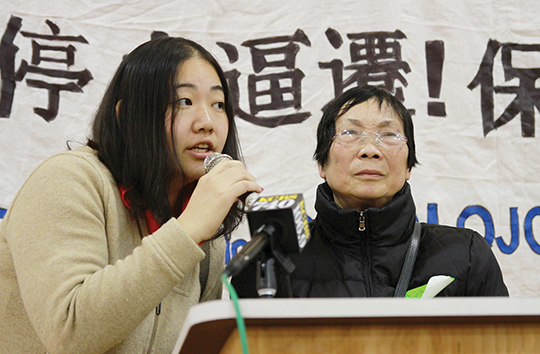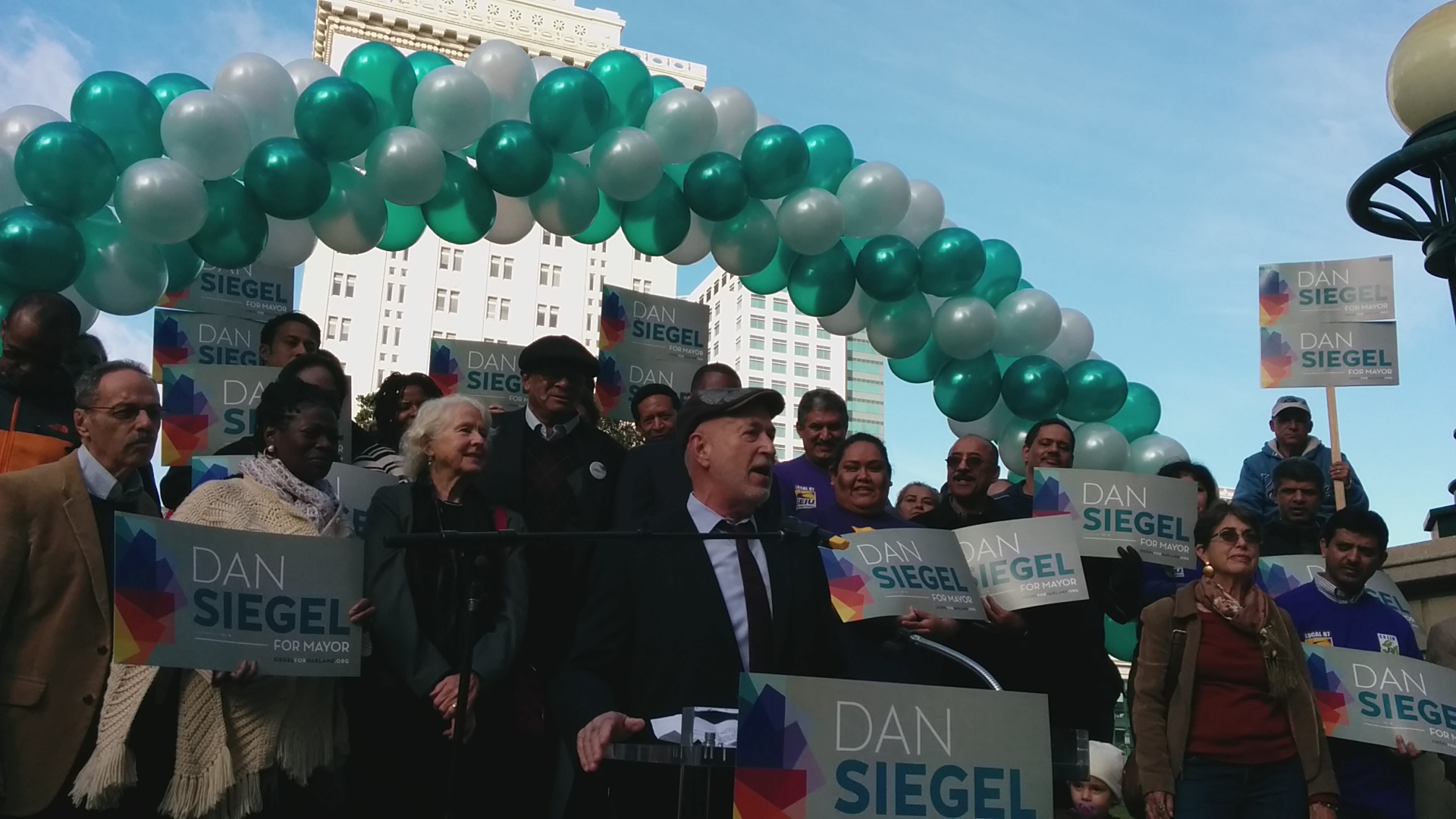rebecca@sfbg.com
Despite the rain on Feb. 8, organizers of a citywide tenants’ convention at San Francisco’s Tenderloin Elementary School wound up having to turn people away at the door. The meeting was filled to capacity, even though it had been moved at the last minute to accommodate a larger crowd than initially anticipated.
“Oh. My. God. Look at how many of you there are!” organizer Sara Shortt, executive director of the Housing Rights Committee, called out as she greeted the hundreds in attendance. “Tenants in San Francisco, presente!”
The multiracial crowd was representative of neighborhoods from across the city, from elderly folks with canes to parents with small children in tow. Translators had been brought in to accommodate Chinese and Spanish-speaking participants.
Six members of the San Francisco Board of Supervisors also made an appearance: Sups. John Avalos, David Campos, Eric Mar, Malia Cohen, Jane Kim, and Board President David Chiu.
In recent weeks, the convention organizers had convened a series of smaller neighborhood gatherings to solicit ideas for new policy measures to stem the tide of evictions and displacement, a problem that has steadily risen to the level of the defining issue of our times in San Francisco.

Ana Godina, an organizer with the SEIU, went to the convention with her daughter Ella, 5. Godina drove from Sacramento to support her colleagues. Three of her fellow union members have been evicted recently, all of them Tenderloin and Mission residents. Guardian photo by Amanda Rhoades
While several legislative proposals are on track to move forward at the Board of Supervisors, the meetings were called to directly involve impacted communities and give them an opportunity to shape the legislative agenda on their own terms, according to various organizers.
Addressing the crowd, Shortt recalled what she termed “some amazing jiu jitsu” during last year’s tenant campaigns, which resulted in a 10-year moratorium on condo conversions rather than simply allowing a mass bypass of the condo lottery, as originally proposed.
That measure, which won approval at the Board of Supervisors last June, was designed to discourage real estate speculators from evicting tenants to convert buildings to tenancies-in-common, a shared housing arrangement that’s often a precursor to converting rent-controlled apartments into condos.
That effort brought together the founding members of the Anti Displacement Coalition, and momentum has been building ever since. “This is the beginning of a movement today,” Gen Fujioka of the Chinatown Community Development Center, one of the key organizations involved, told the gathering. “We are shaking things up in our city.”
MAINTAINING DIVERSITY
Around 160 participants attended the first in a series of neighborhood tenant conventions in the Castro on Jan. 10. The one in the Richmond a week later drew so many participants that organizers had to turn people away to appease the fire marshal.
“The idea of the neighborhood conventions was to solicit ideas,” explained Ted Gullicksen, head of the San Francisco Tenants Union. “The idea of this event is to review existing ideas and ultimately rank them.” From there, the campaign will pursue a ballot initiative or legislative approval at the Board of Supervisors.

Ted Gullicksen, director of the San Francisco Tenants Union, and his dog Falcor. Guardian photo by Amanda Rhoades
But first, a few speakers shared their stories. Gum Gee Lee spoke about being evicted from her Chinatown apartment last year along with her husband and disabled adult daughter, an event that touched off a media frenzy about the affordable housing crisis taking root in San Francisco.
“There were times that were very stressful for me. I would call places only for the owner to say, ‘I’ll get back to you,’ but they never did,” she said of that ordeal.
“To see everyone here, all kinds of people, it makes me really happy,” she later told the Bay Guardian through a translator. “I just hope they don’t get evicted.”
Mike Casey, president of UNITE-HERE Local 2 and an executive committee member of the San Francisco Labor Council, also made a few comments at the forum.
“Having the ability to live and vote in this city makes a difference,” he pointed out, saying workers who have to commute long distances for political actions because they’ve been displaced from San Francisco are less likely to get involved.
“The struggle of our time is the widening gap between the rich and the poor,” Casey added. “That is exactly what this struggle is about: to maintain that diversity. What we need to move forward on is bold, effective, measurable change that makes sure we are able to protect the fabric of this community.”
Maria Zamudio, an organizer with Causa Justa/Just Cause, emphasized the idea that the problem of evictions in San Francisco is less of a market-based problem and more of a threat to the city’s existing, interwoven communities.
“Those are our neighborhoods and our communities,” Zamudio said. “We’re fighting for the heart of San Francisco. Fighting for strong tenant protections is a necessary struggle if we are going to keep working class San Franciscans in their homes.”
ELLIS ACT UNDER FIRE
As Gullicksen noted at the start of the convention, San Francisco rents have ballooned in recent years, rising 72 percent since 2011.
“We are seeing the most evictions we have seen in a long, long, long, long time,” Gullicksen said. “Most Ellis evictions are being done by one of 12 real estate speculators — evicting us and selling our apartments, mostly to the tech workers.”
Even though median market-rate rents now hover at around $3,400 per month in San Francisco, low-income tenants can avoid being frozen out by sudden rental spikes because rent-control laws limit the amount rents may be increased annually.
But that protection only applies to a finite number of rental units, those built before 1979. That’s why tenant advocates speak of the city’s “rent-controlled housing stock” as a precious resource in decline. Long-term tenants with rent control — in the worst cases, elderly or disabled residents who might be homeless if not for the low rent — are often the ones on the receiving end of eviction notices.
From 2012 to 2013, according to data compiled by the Anti Eviction Mapping Project, the use of the Ellis Act increased 175 percent in comparison with the previous year. That law allows landlords to evict tenants even if they’ve never violated lease terms. Advocates say real estate speculators frequently abuse Ellis by buying up properties and immediately clearing all tenants.
Concurrently with local efforts agitating for new renter protections, organizers from throughout California are pushing to reform the Ellis Act in Sacramento.
Assemblymember Tom Ammiano has promised to introduce a proposal by the Feb. 21 deadline for submitting new legislation, and Sen. Mark Leno is working in tandem with San Francisco Mayor Ed Lee on a parallel track to pursue some legislative tweaks aimed at softening the blow from the Ellis Act.
“Our goal is to change the conversation in Sacramento, where tenants’ concerns are routinely ignored,” said Dean Preston, director of Tenants Together, a statewide organization based in San Francisco.

Those who didn’t speak English were given head sets so they could listen to each of the speakers comments, which were translated into either Spanish or Chinese. Guardian photo by Amanda Rhoades
On Feb. 18, busloads of protesters will caravan to Sacramento from San Francisco, Oakland, and Fresno for a rally. Preston said they’ve got three demands: reform the Ellis Act, restore a $191 million fund that provides financial assistance for low-income and senior renters, and pass Senate Bill 391, which would provide new funding for the construction of affordable housing.
Even though the law is technically intended to allow property owners to “go out of the business” of being a landlord, Ellis Act evictions in San Francisco are most often carried out by speculators who purchase real estate already occupied by tenants, Gullicksen said.
“Our focus is on the most immediate problem, which is the misuse of the Ellis Act by real estate speculators,” Preston said. “It’s urgent to address that specific use. That’s what Ammiano and Leno are looking at, is ‘what’s the best way to stop speculative use?'”
LOCAL POLICY CHANGES SOUGHT
Tyler McMillan of the Eviction Defense Collaborative said his group is often the last resort for tenants threatened with the loss of their rental units. “Too often, we face a losing fight at court,” he said. “We need to write better laws that work better to keep people in their homes.”
The legislative proposals moving forward at the local level seek to attack the problem of evictions and displacement from several angles. On Feb. 3, Sup. David Campos introduced legislation to require landlords who invoke the Ellis Act to pay a higher relocation fee to displaced tenants, equaling two years’ worth of the difference between the tenants’ rent and what would have been considered market rate for that same unit.
“It is time that we recognize that tenants must receive assistance that is commensurate with market increases in rent if we are to truly address our affordability crisis and check the rampant growth of Ellis Act evictions,” Campos said.
As things stand, relocation assistance payments are around $5,261 per tenant, and are capped at $15,783 per unit, with higher payments required for elderly or disabled tenants. But at current market rates, a tenant would not last more than a few months in the city relying solely on the relocation fee to cover rental payments.
Surveying the strong turnout at the tenant convention, Campos said, “There is a movement that’s happening in San Francisco to take our city back, and to make it affordable for all of us.” Yet he noted that he is concerned there will be major pushback from the San Francisco Apartment Association and the real estate industry, formidable interests that oppose the relocation fee increase.
Meanwhile, Sup. Mar has proposed an ordinance that would require the city to track the conversion of rental units to tenancies-in-common, a housing arrangement where multiple parties own shares of a building through a common mortgage. Speculators who buy up properties and immediately evict under the Ellis Act often angle for windfall profits by immediately converting those units to TICs.
Campos is also working on legislation that would regulate landlords’ practice of offering tenants a buyout in lieu of an eviction, a trend advocates say has resulted in far greater displacement than Ellis Act evictions without the same kind of public transparency.
Peter Cohen of the Council on Community Housing Organizations said there’s “no silver bullet” to remedy San Francisco’s affordable housing crisis. “This process is going to come up with another bundle of things,” he said. “All of that is also complimentary to the state campaign. You could have five, six, or seven policy measures going forward — and all of them winnable.”
An idea Cohen said has received traction is the idea of imposing an anti-speculation tax to discourage real estate brokers who abuse the Ellis Act by buying up properties and evicting all tenants soon thereafter (see “Seeking solutions,” for details).
During a breakout session at the tenant convention, longtime LGBT activist Cleve Jones piped up to say, “Harvey Milk proposed the anti-speculation tax back in 1979.”
It wasn’t successful at that time, but Cohen said that given the current level of concern about housing in San Francisco, it’s being talked about in some circles as the most winnable ballot initiative idea.
TENANTS FIGHTING BACK
At the Feb. 8 convention, tenants shared stories of challenging orders to vacate their rental properties. “The most important thing that has brought us to the victories we’ve had so far is that tenants have stayed in their homes,” Shortt said. “Tenants have fought, tenants have sought help, tenants have organized.”
Tenants from a North Beach building owned by real estate broker Urban Green shared their story of banding together and successfully challenging an Ellis Act eviction. Chandra Redack, a nine-year resident of 1049 Market St., where tenants continue battling with owners who submitted eviction notices last fall, described to the Bay Guardian how her small group of tenants has continued to organize in the face of ongoing pressure, including the owners’ recent refusal to accept rent checks.
“Our organizations only can support tenants when they stand up and fight,” said Fujioka. “The tenants’ resistance themselves is part of the strategy. If we don’t have rights, we are going to create them.”
Paula Tejeda, a longtime resident of the Mission District originally from Chile, told the Bay Guardian that she’d been threatened with an eviction from her home of 17 years, a Victorian flat on San Carlos Street.
“I thought I was dealing with an Ellis Act, now he’s trying his best for a buyout,” she explained.
Living in that rent-controlled unit made it financially feasible for her to contribute to the Mission community as a small business owner, as well as a poet, author, and active member of the arts community, she said. Tejeda is the proprietor of Chile Lindo, an empanada shop at 16th and Van Ness streets.
“Having the rent control made it possible for me to build Chile Lindo, go back to college and get my MBA,” she said. That in turn gave her the resources to employ one full-time and three part-time staff members, she said.
When she was initially faced with the prospect of moving out, “I wanted to shut down and leave, and go back to Chile,” she said. “We are suffocated, as a society that cares only about the bottom line.”
But surveying the hordes of tenants milling about at the convention, she seemed a bit more optimistic. “The fact that this is happening to everyone at the same time,” she reflected, “is kind of like a mixed blessing.”

Free lunch, had some vegan options. Guardian photo by Amanda Rhoades
Seeking solutions
A number of policy ideas emerged from the neighborhood tenant conventions, which were held by the San Francisco Anti Displacement Coalition in the Mission, Chinatown, Haight/Richmond, Castro, SoMa, and the Tenderloin.
Here’s a list of what tenants came up with at those forums, which attendees ranked in ballots collected at the event. The ideas will most likely result in a November ballot initiative and one or more legislative proposals, which organizers plan to announce in the near future.
Anti-speculation tax: One idea is to impose a tax on windfall profits garnered by speculators who buy up housing and then sell it off without maintaining ownership for at least six years. The tax would be structured in such a way that the quicker the “flip,” the higher the tax. This would require voter approval.
Eviction moratorium: This proposal is to put a yearlong freeze on certain kinds of “no-fault evictions,” instances where a tenant is ousted regardless of compliance with lease terms. State law would prohibit it from applying to Ellis Act evictions. It might potentially require voter approval.
Department of Rent Control Enforcement and Compliance: This new department, which could be done by local legislation, would create a new city department with the mission and mandate to enforce existing tenant-protection laws and conduct research on eviction trends.
Relocation assistance: While Sup. David Campos is working on legislation to upgrade relocation assistance payments to displaced tenants who face eviction under the Ellis Act, this proposal would do the same for all other forms of “no-fault” evictions. This would require voter approval.
“Excessive rents” tax: While the Costa-Hawkins state law does not allow for cities to control rents in vacant units, this proposal would create a tax on new rental agreements where rents exceed an affordability threshold.
Housing balance requirement: This proposal would make it so that approval of new market-rate housing would be restricted based on whether affordable housing goals were being met. It would create new incentives to build affordable.
Legalize illegal units: This would provide a way to legalize the city’s “illegal” housing units that nevertheless provide a safe and decent source of affordable housing. (Board President David Chiu has already introduced a version of this proposal.)
















